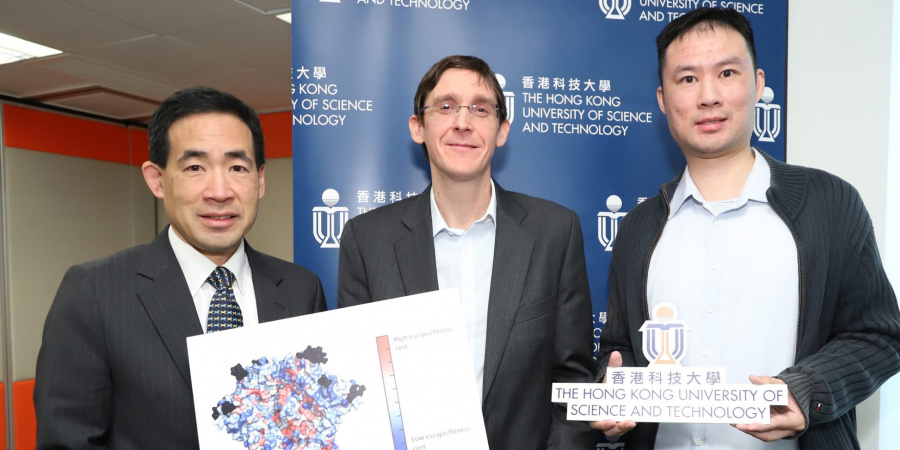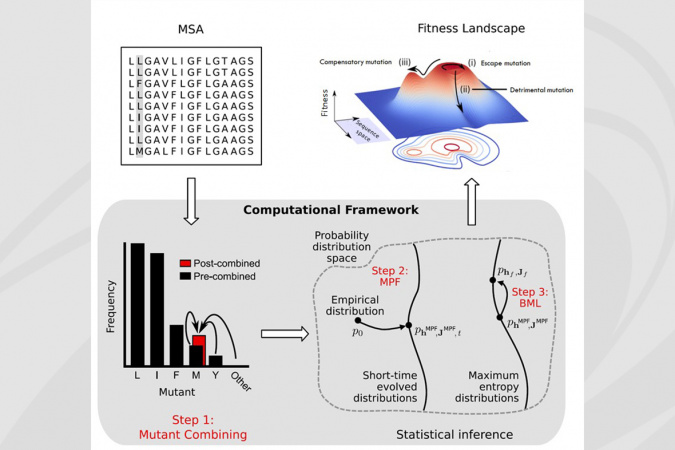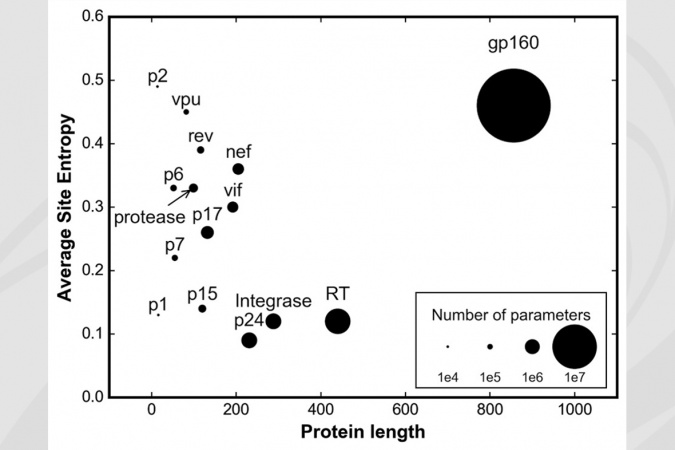HKUST Researchers Discover Fitness Landscape of HIV Envelope Protein That May Help Vaccine Development
An international multi-disciplinary research team led by scientists at the Hong Kong University of Science and Technology (HKUST) has discovered for the first time a computational framework that could map out the fitness landscape of a crucial protein in the human immunodeficiency virus (HIV), potentially paving the way for rational design of a vaccine that may force the deadly virus to mutate into forms that lead to its demise.
Despite significant advances in medicine, an effective vaccine for HIV is still not available, although recent hope has emerged through the discovery of antibodies capable of neutralizing diverse HIV. The virus, however, can still evade known broadly neutralizing antibody responses via mutational pathways, which makes it all the more difficult to design an effective solution.
Now, Prof Matthew MCKAY and Prof Raymond LOUIE from HKUST have come up with a possible solution together with Prof Arup CHAKRABORTY and his group members from the Massachusetts Institute of Technology – using big data analysis. The team employed a computational approach to estimate the fitness landscape of the polyprotein gp160 that comprises HIV’s surface spikes. The fitness landscape is a mapping from sequence to fitness, where fitness refers to the ability of the virus to properly assemble, replicate, and propagate infection. Knowledge of the fitness landscape can give scientists important clues as to which part of the virus’ spike proteins they should target, so as to corner the virus to mutate into forms that would severely compromise its fitness and its ability to reproduce and replicate.
Prof McKay is the Hari Harilela Associate Professor in the Departments of Electronic & Computer Engineering and Chemical & Biological Engineering; Prof Louie is a Research Assistant Professor in the Department of Electronic and Computer Engineering and Junior Fellow of HKUST Institute for Advanced Study. Their findings were published in the prestigious scientific journal, Proceedings of the National Academy of Sciences USA (PNAS) last month.
“Without big data, it is simply impossible to make such prediction,” said Prof Louie. “The number of parameters needed to be estimated came close to 4.4 million.”
Prof McKay highlighted that the computational method offers fast and accurate results. “The findings can assist biologists in proposing new immunogens and vaccination protocols that seek to force the virus to mutate to unfit states in order to evade immune responses, which is likely to thwart or limit viral infection,” he said. “Beyond the application to HIV-gp160, our approach may also be useful for identifying fitness landscapes for proteins of other highly mutable viruses, such as Hepatitis C.”
Mapping of the HIV envelope protein gp160 is more challenging than other HIV proteins as its primary sequence is more than twice as long as its peers and is amongst the most variable. The team processed data consisting of 815 residues and 20,043 sequences from 1,918 HIV-infected individuals. They then verified the inferred landscape through comparisons with diverse experimental measurements.
As of September 2017, the cumulative total number of reported HIV infections in Hong Kong is 8,952 [1], while globally an estimated 36.7 million people were living with HIV in 2016 [2].
About The Hong Kong University of Science and Technology
The Hong Kong University of Science and Technology (HKUST) (www.ust.hk) is a world-class research university focusing on science, technology and business as well as humanities and social science. HKUST offers an international campus, and a holistic and interdisciplinary pedagogy to nurture well-rounded graduates with global vision, a strong entrepreneurial spirit and innovative thinking. HKUST attained the highest proportion of internationally excellent research work in the Research Assessment Exercise 2014 of Hong Kong’s University Grants Committee, and is the world’s second in the latest QS’ Top 50 under 50 ranking. Its graduates were ranked 12th worldwide and top in Greater China in Global Employability University Survey 2017.
[1] http://www.info.gov.hk/gia/general/201711/28/P2017112800221.htm?fontSize=2
[2] https://www.avert.org/global-hiv-and-aids-statistics
(This news was originally published by the HKUST Public Affairs Office here.)



